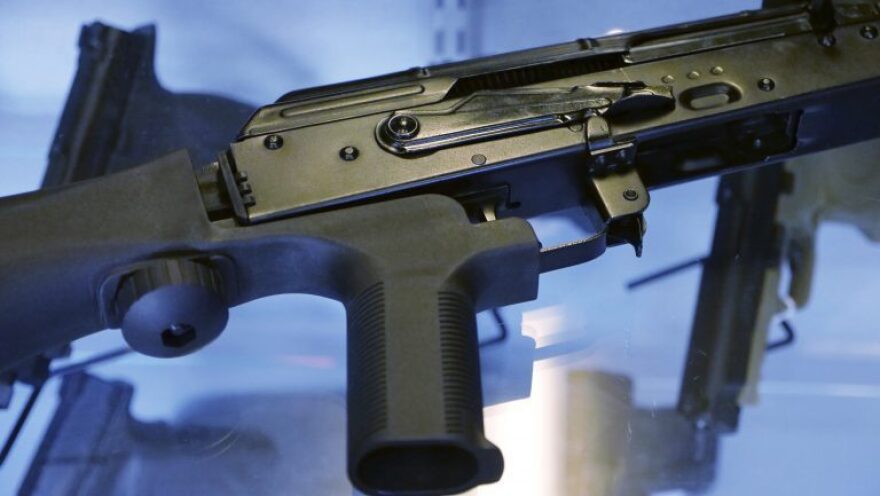As a nationwide ban took effect this week, gun owners must immediately destroy or turn over their bump stocks after President Trump pushed the Justice Department to classify the controversial gun add-on as a type of illegal machine gun.
The gun accessory attaches to the butt of a semi-automatic rifle, allowing the weapon to reload and fire more rapidly.
The device became a focal point in the country's debate about gun violence in the months after law enforcement officials said a shooter used one to kill 58 people in Las Vegas in October 2017.
Legal challenges were mounted, but none were able to derail the ban, which officially took effect on Tuesday. Now, those who ignore it and keep their bump stocks can face prison time and thousands of dollars in fines.
Damien Guedes, 39, of Whitehall, Lehigh County, is among the many gun owners across the country testing the law.
He purchased a bump stock in October 2014 from the website Bump Fire Systems and insists that he should be able to keep it without punishment. He is suing the federal government in hopes of overturning the ban. The case is currently being appealed and courts have ruled that Guedes and the other plaintiffs in the case will not have to surrender their bump stocks while the outcome of the suit is pending.
Gun rights attorney Erik Jaffe is representing Guedes and calls the ban pointless. He said there are many other ways to make a semi-automatic gun operate like a machine gun.
"You can do it with your finger. You can do it with a stick. You can put a stick inside the trigger and push on the back of the gun and that will bump-fire the gun," Jaffe said. "You can do it with a rubber band. You can do it with a shoelace. We've come up with dozens of ways you can make a semi-automatic weapon move fast."
Backers of stricter gun laws praised the Trump administration for taking action to outlaw the firearm attachment, although some view it as past-due incremental progress.
"No one needs this 'accessory,' and it is shameful that it took so long after the horrific mass shooting in Las Vegas to finally get to this point," said Shira Goodman, executive director of CeaseFirePA.
Unlike some local gun buyback programs, the federal government will not reimburse people who legally purchased bump stocks, which can cost up to hundreds of dollars.
Charlene Hennessy, a Pennsylvania-based spokeswoman for the Bureau of Alcohol, Tobacco, Firearms and Explosives, said some owners have turned the devices in but "we are not tracking the amount turned in," she said. "I have personally spoke with some owners that have called to ask what their options are."
Hennessey said the options include returning the bump stock to an A.T.F. field office or destroying the device by melting, shredding or crushing it. "Any method of destruction must render the device incapable of being readily restored to function," according to the federal government's guidance.
Gun control advocates have long seen outlawing accessories like bump stocks, in addition to passing laws that would ban high-capacity magazines and require universal background checks, as part of the response to the high rate of gun-related killings in the country.
In Pennsylvania, according to state figures, there are more than 1,500 gun deaths every year.
Jaffe, who is also a member of the conservative legal group the Federalist Society, argues that more regulations will not avert deadly shootings.
"This is a worse Band-Aid on a bigger problem," he said. "Do you really think the issue is fast firing, as opposed to mental illness?"
On the bump stock ban, Jaffe argues not only is it bad policy but a "goofy interpretation" of long-standing rules regulating illegal machine guns.
"The definition the A.T.F. is trying to impose on the statute for machine guns would make a lot of things machine guns," Jaffe said.
One thing that critics of the bump stock ban and proponents can largely agree on: Regulating firearms and gun accessories should be left to state lawmakers and Congress, not the A.T.F.
"We need Congress and Harrisburg to take decisive and swift action to address our gun violence crisis," Goodman said.
The A.T.F. would not comment on how many bump stocks are possibly in circulation in Pennsylvania, but nationwide, officials say more than 500,000 of the devices have been sold.





